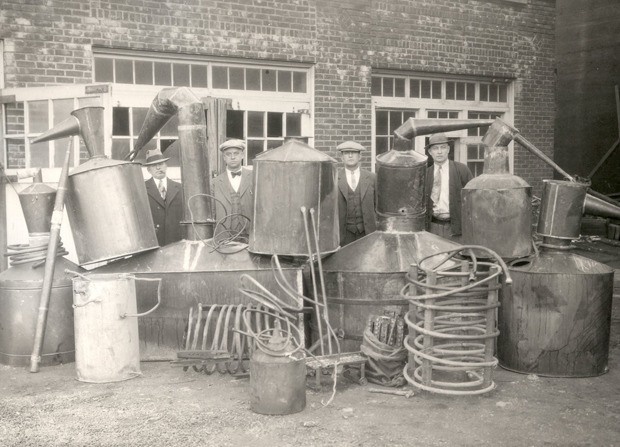Temperance crusader Carrie Nation once more slams her famous hatchet into saloon counters, bootleggers hustle cheap liquor and spray bullets and still after still falls to King County’s relentless Sheriff Matt Starwich and his Dry Squad.
Only thing that seems to be missing from White River Valley Museum’s latest exhibit “Stills in the Hills: Homebrewed Hooch in the Age of Prohibition,” is a speakeasy door with a sliding slot, a slope-foreheaded goon with a hairy eyeball on the other side, a secret word to get you in.
Confiscated stills, old booze bottles, signage, newspapers and photographs shake the dust and cobwebs off Prohibition and make a present tense of the era in American history, 1920 to 1933, when the government tried to turn off the tap before opening it again with the 21st Amendment outlawing prohibition.
The exhibit opened Wednesday and closes Nov. 4.
Visitors will learn how the Women’s Christian Temperance Union, the KKK, select Unions, Seventh-day Adventists, and the International Workers of the World formed an unlikely alliance to fight for a prohibition on the sale and manufacture of alcohol in Washington state (1916).
Because it wasn’t yet against the law to drink the stuff, however, independent entrepreneurs, organized crime, local politicians and police became players, providing the public with the fermented stuff it craved. On the other side of the law, cops worked tirelessly and fearlessly — though in vain — to see to it that the thirsty public didn’t get a drop.
Local stories shine a light on a host of colorful, long dead characters, from Auburn’s own Starwich, to Seattle’s Roy Olmstead, the “Good Bootlegger,” to the political leaders and gangsters who conspired to make Tacoma a “wet city.”
Museum director Patricia Cosgrove and her crew have divided the exhibit into scenes and set the whole show, from the local women’s fight for Prohibition, the closing of Auburn’s saloons, to regional bootlegging and enforcement efforts, to 1920s music.
Heritage Distilling Company, Inc. of Gig Harbor, where “Every Spirit Has A Story” is partly sponsoring the exhibit.
“Heritage Distilling Company is proud to be a sponsor of this exhibit,” said Jennifer Stiefel, president of Heritage Distilling Company
The company soon will offer programs for individuals to legally come in and be directly involved in an activity that would have set Starwich and his band on the trot — making and aging customized distilled spirits, starting with whiskey, gin and vodka.
As during Prohibition, the making of distilled spirits at home is still illegal without meeting numerous licensing requirements that make it impractical to produce spirits for personal beverage use. But with the company’s “My Batch” and “Cask Club” programs the door is now open for the public to get a first-hand taste of how spirits are made.
“That is why helping to sponsor this exhibit was an easy choice for HDC,” Stiefel said.
The grand opening for the distillery is Saturday, Nov. 3. For more information, go to www.HeritageDistilling.com, and follow it on Facebook and Twitter.
=====
Upcoming museum events
• Prohibition in Washington, a lecture and slide show by guest curator and Green River Community College history professor Mark Thomason, is Sept. 20. An open house begins at 6 p.m. with the lecture to follow at 7. The event is included in regular museum admission.
• Hops and Crops Brew Festival, a family-friendly festival of craft beers, local music, food, arts and a kids root beer garden at the beautiful historic Mary Olson Farm. Sept. 15, noon to 6 p.m. $15 taster admission, $7 general admission.
The White River Valley Museum is at 918 H St. SE, Auburn. Regular admission: $2 adults, $1 seniors and children. Admission is free on Wednesdays and the fourth Sunday of the month. Call 253-288-7433 or visit www.wrvmuseum.org for tickets and event information.
PHOTO BELOW:
Local entrepreneurs knew how to brew moonshine in homemade distilleries or stills by 1920. This pile represented only the most recent collection of confiscated stills taken from Pierce County bootleggers in 1920. Courtesy/WRVM


